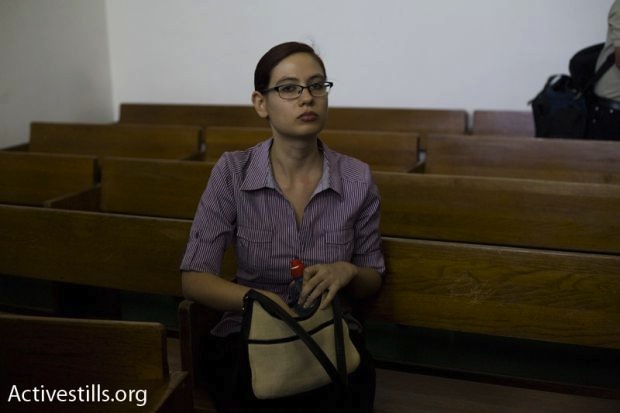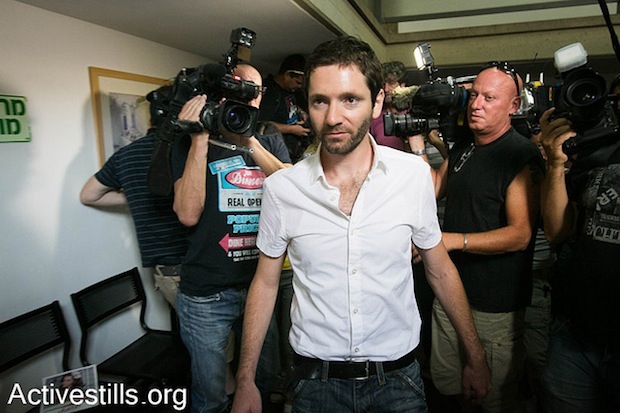More worrying than the institutional instruments that enable censorship are the multiple forms of self-censorship that are deeply ingrained in the journalistic practices and conventions of Israeli media.
By Ido Liven
As the Hebrew proverb goes, “be a tail among lions rather than a head among foxes.” In Freedom House’s latest report, Israel’s state of press freedom demonstrates just that. In the organization’s 2012 report, Israel scored 30 on a scale of 10 to 97, putting its press freedom status at the bottom of the better “free” category. In the 2013 report, released on May 1, the country lost one point, enough to downgrade it to the top of the next lower category of “partly free,” together with Chile, Namibia and South Korea.
Several recent developments have rattled the country’s press freedom status, and have helped to raise important questions regarding both institutional censorship and self-censorship.
At least in the legal sense, Israel’s relationship with the press would seem to put it at odds with other modern democracies. 65 years since its establishment, Israel has never put into law either freedom of expression or freedom of the press. Moreover, a Press Ordinance, inherited from the pre-state days, stipulates that newspapers and their chief editors require a license, and even empowers the state to shut down publications at its discretion. A number of new laws and bills – such as an anti-boycott law, and a proposed amendment to the libel law – have been called a further threat to freedom of expression and the press.
***
Internationally, Israel is known as a major news hotspot, but those reporting from the country, predominantly on the longstanding Israeli-Palestinian conflict, are at times restricted. Press freedom and human rights advocates often point to Israel’s conduct in the occupied Palestinian territories as inhibiting journalists – Palestinian and international alike – from operating freely. Moreover, Palestinian groups as well as the Foreign Press Association have accused the Israeli army of harassing, arresting and attacking reporters and avoiding carrying out thorough investigations into such incidents. Recent press freedom assessments harshly criticized Israel for targeting media personnel during Operation Pillar of Defense in Gaza in 2012, specifically for killing a crew from Hamas’ Al Aqsa TV.
Consequently, Reporters without Borders’ (RwB) latest Press Freedom Index ranked Israel at a record-low 112th place. The 20-position drop in the index was explained by “the Israeli military’s targeting of journalists in the Palestinian Territories,” which as the report itself indicates, previous reports classified separately.” A separate, and even lower score remains for Palestine.
And while attention should be called to this worrying assessment, very few Israeli media outlets deemed it newsworthy. “It would be good if this index makes for a moment of self-scrutiny for Israel’s media makers,” Israeli media watchdog Keshev stated in a blog post. “Instead of focusing on our place compared to that of Albania [ranked 102nd – I.L.], it would be better to address the reasons for the decline in the degree of freedom and independence of the Israeli press – this is what we should really be concerned about.”
But this situation seems to stand in stark contrast with the overall climate in which news is produced in the country. “Israel enjoys a lively, pluralistic media environment in which press freedom is generally respected,” states Freedom House’s 2012 report. “Some [newspapers] freely criticize government policies and aggressively pursue cases of official corruption,” it adds.
Indeed, there are countless examples of the crucial role the media has played in shaping the discourse in Israeli society and its democratic characteristics. Investigative reports have been instrumental in exposing political corruption, military wrongdoing, human rights violations and more –in fact, it is in this light that repeated attempts by some lawmakers to tame democracy’s watchdog, supposedly in a bid to enforce responsibility, should be understood.
Though, one issue has always been a media hot potato. In a country that sees itself as constantly facing an existential threat, any information that can be interpreted as a challenge to national security becomes highly contentious. A military censor is therefore tasked with ensuring media outlets in Israel do not disseminate information that could compromise national security.
In a 2009 study, Israeli journalists ranked the military censor third (after editors and news organizations’ legal counsels) among factors they considered to be inhibiting their professional freedom.
Contrary to conventional wisdom, the relationship that has evolved between the Israeli media and the military censor is not one of oppression. Through the years, the working relationship between the media and the censor has been streamlined, a result of court rulings and mutual agreements. “The 35 military censors are not faceless, inaccessible bureaucrats who work behind walls,” Aluf Benn, editor-in-chief of Haaretz wrote in a recent op-ed in The Guardian. “You know them personally and you can negotiate the wording to let the story pass.”
Moreover, journalists today tend to submit materials for review only if they fall under an agreed-upon list of “sensitive topics.” At the same time, in line with court rulings, the censor’s working principle is only to disapprove information that could clearly pose an “imminent and immediate danger” to national security if published.
Ultimately, many officials, including former Supreme Court justice and current president of Israel’s Press Council Dalia Dorner, have argued that having materials vetted by censors prior to their publication effectively relieves the journalist of legal responsibility. (In the case of Haaretz reporter Uri Blau, however, a censor’s approval did not prevent his indictment.) Paradoxically, this has led media scholars to conclude that the military censor has become imperative in protecting freedom of the press in Israel.
However, a few cases, the latest being this year, have raised serious doubts over the censor’s role.
Most recently, the case of Prisoner X – the Australian-Israeli Mossad agent who committed suicide in his prison cell after being secretly incarcerated for reportedly compromising national security –brought into question the relevance of censorship in today’s world of globalized media, primarily the Internet. In its aftermath, Israeli authorities’ repeated attempts to prevent the case from being reported by Israeli media – before and after the Australian investigative report that broke it– should have prompted news consumers and newsmakers alike to demand a revisiting of the founding principles of both the military censorship and gag orders. Instead, it exposed the Israeli media’s underbelly.
Haaretz, however, did stand out. “I don’t want to know more than my readers,” the newspaper’s chief editor Aluf Benn later wrote in The Guardian, explaining his refusal to participate in the Editors’ Committee meeting called in the wake of the affair. “If [Mossad chief Tamir Pardo] wants to explain, he should talk to the public, not to turn editors into intelligence ‘assets’.”
Press Council President Dorner voiced similar criticism. “Self-censorship is something that cannot be acceptable nowadays. I thought the Editors Committee no longer exists. I was surprised, negatively,” she said on public broadcast radio.
The complete blackout imposed on Israeli media by a blanket gag order, critics argued, was both outdated and counterproductive. Originally, the purpose of state censorship was to prevent information that could compromise national security from reaching hostile entities. But, as Dorner and others have pointed out, this very case proved the futility of such measures when media elsewhere in the world were reporting the entire case. “This is passé and pathetic,” former head of the Mossad Danny Yatom told daily newspaper Maariv, “and the fact is that they understood it themselves and one day after the affair was published around the world, it was published here as well.”
A few weeks later, in a panel session at Bar Ilan University dedicated to press freedom in light of the Prisoner X affair, chief censor Brig.-Gen. Sima Vaknin-Gil acknowledged, that “censorship and democracy do not go hand in hand.” However, she later stressed that she does not take freedom of expression or the public’s right to know into consideration “in any instance where a person is sent secretly, or in any other way, in the service of the state.”
Uzi Arad, a senior strategist and formerly a national security advisor to the prime minister, expressed a similar view of the military censorship as a so-called necessary evil. “This is an anti-democratic, arbitrary instrument but it protects things we would like to protect,” he told Maariv. “We’re in the midst of a security struggle that hasn’t changed in the past decades, and in such reality one has to protect secrets,” explained Shlomo Gazit, former head of the Military Intelligence Directorate.
Even prior to the Prisoner X affair breaking, a number of media outlets reportedly worked to challenge the gag order in order to remove it altogether or at least relax it, but to no avail. “The weak and burdened-with-guilt-feelings in Israeli press – the one seen by broad circles in the public as unpatriotic exactly because it fulfills its roles – does not deserve to boast the achievement of [the eventual] publication,” wrote Hanoch Marmari, former chief editor of Haaretz and today chief editor of media journal The Seventh Eye. “The press has submissively accepted the iron wall that had been installed around this awkward case.”
Occasionally, Israeli journalists do admit, or even approve of practicing self-censorship. In 1982, at the outset of the First Lebanon War, an op-ed in the daily Yedioth Ahronoth called on journalists, and the public, to avoid criticizing the government during wartime. The column’s title, “Silence, we’re shooting,” became a maxim.
Speaking at the Bar Ilan University panel, Israeli public broadcast radio’s longtime military correspondent Carmela Menashe acknowledged the common practice of self-censorship. “This hug [journalists] get from the defense minister or the chief of staff, who sit with them and eat with them, encourages some of them to censor themselves and not print things,” The Jerusalem Post quoted her as saying.
According to data from the military censor published in The Seventh Eye journal in March 2012, Israeli journalists tend to voluntarily employ stricter censorship than that of which is institutionally demanded. The information showed that between 2002 and 2011, censors intervened in 17 to 20 percent of the texts media submitted annually (with the exception of 2004 where the rate stood at 25 percent). During the 2006 Second Israel-Lebanon War, the intervention rate reached between 30 and 24 percent. In other words, the vast majority of news material was submitted for censor review, not necessarily because it contained sensitive information, but simply because journalists preferred to shift responsibility to the authorities.
***
Yet, despite Prisoner X being a highly unusual case, it was hardly unprecedented – neither in the way state authorities handled the person at the center of the row, nor in the way they dealt with its coverage in the media.
In Israeli society today, the de facto preponderance of so-called immediate national security threats means that any criticism of Israel’s defense apparatus is considered a threat to national security, even if there is little evidence to suggest such risk. There is no way to generalize, but free press does not seem to be as readily associated with the public interest as national security is – among journalists and the general public.
Therefore, perhaps more worrying than the institutional and legal instruments that at once enable censorship and do not safeguard press freedom but do enjoy public support, is the multiple forms of self-censorship – or rather, a genuine and understandable fear of consequences for confronting authorities – that are deeply ingrained in the journalistic practices and conventions of Israeli media. For a media (and public discourse) that fames itself of being particularly critical, and rightly so, this really is a peculiar situation. But one has to consider where public discontent is effectively channeled to.
If there is one thing that illustrates this awkward equilibrium, it is the aphorism “according to foreign sources.” Under this rhetorical fig leaf, Israeli media publish information they consider as being in the public interest but are restricted by state censorship from directly attributing it to Israeli sources. Perhaps the most longstanding example is Israel’s policy of deliberate ambiguity on possession of nuclear weapons.
It’s not that these publications are not credible – otherwise Israeli media would not cite them – it’s just that their reports are not considered as official as Israeli sources.
And international media has been playing a key role in this context. Israeli journalists who do recognize the military censor as a hurdle to publishing information of profound public interest (also on the international level) leak it to media abroad, and run a story “according to foreign sources.” The Prisoner X story is one such example.
However, going beyond this code-phrase, once journalists acknowledge the supreme importance of the public interest, they must also recognize the importance of transparency, not only from the subjects of coverage but also of their own work. There is no real reason why gag orders should not be made public.
And this should also be the case when journalists recognize, often following (online) public pressure, that censorship is being abused beyond its mandate. Yedioth Ahronoth‘s coverage of Anat Kamm’s arrest, when the newspaper ran a story with whole passages blacked out, proved this is possible. But it was also the exception that proved the rule – not on the part of the military censor, but on the part of the media.
Calls to scrap the military censor altogether have been scarce. Suggestions for reforming it – for instance, by moving it to the Prime Minister’s Office – or for exploring alternatives, have been even more rare. “I wouldn’t dare to demand such reform today, knowing that anything achieved would only aggravate control and perpetuate the censoring body,” wrote Marmari. Haaretz’s chief editor Benn concluded, “As long as ‘state security’ is sacred in the public mind, we will have censorship.”
Moreover, abolishing institutional state censorship is unlikely to improve press freedom: self-censorship might become even more rife among journalists and media outlets that wouldn’t want to take risks. Nevertheless, self-regulation and adherence to professional values would be much better than legal regulation and official censorship. And here is the bottom line: self-regulation, when dealing with issues that could potentially challenge national security, must be weighed against the public interest.
The common assumption that the public interest and national security are always one and the same simply doesn’t hold water. Israel has already seen several cases over the years – not only the Prisoner X story, the Uri Blau case, or the milder experience of blogger Eishton – where censorship or persecution have been invoked essentially as kneejerk reactions, in bids by the government and state agencies to save face, and for not for purposes of state security.
Ido Liven is an independent journalist covering mainly environmental issues and foreign affairs for Israeli and international publications.
Related:
‘Prisoner X’: Censorship and gag orders in the age of new media
Blogger offers army deal: Release information, and I’ll go to prison willingly



